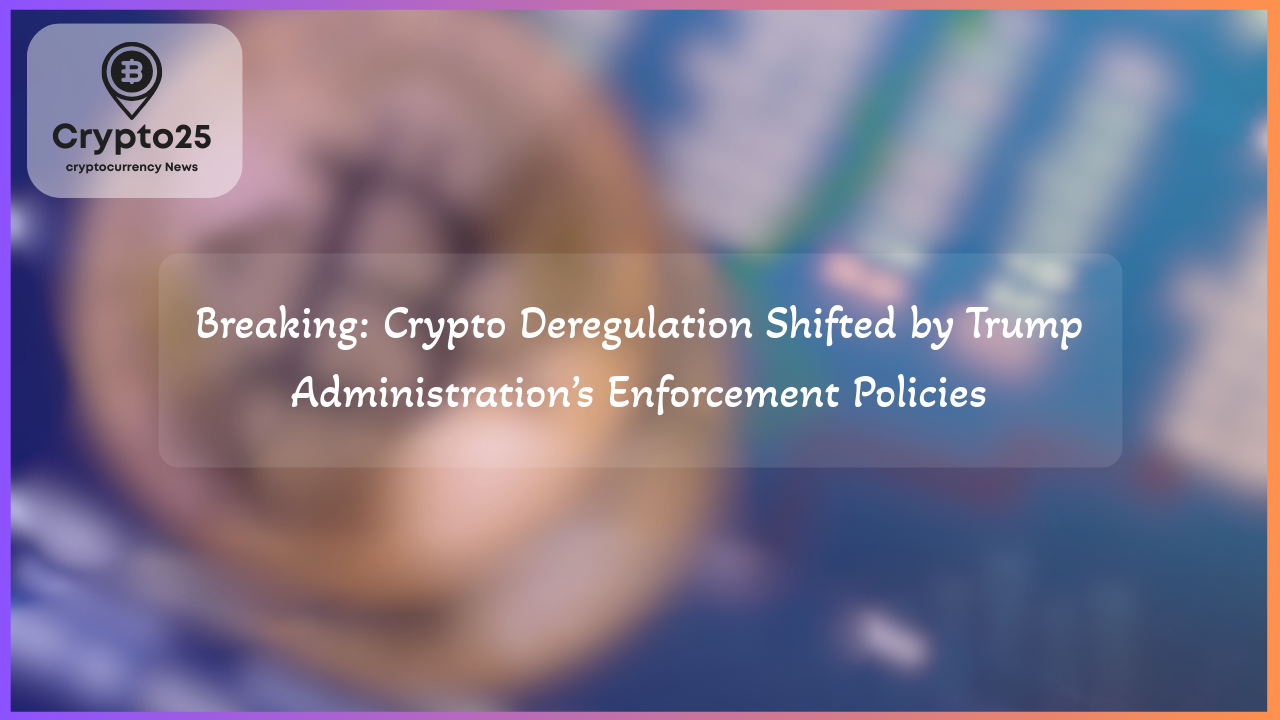
The U.S. crypto industry stands at a crossroads as federal policies experience a remarkable transformation. Under President Donald Trump, the administration’s pivot towards deregulation has created a robust wave of optimism, marking a stark contrast to the rigorous oversight established during the Biden presidency. By loosening regulatory measures and fostering innovation, this shift signals a promising era for institutional players and crypto entrepreneurs alike.
### The Biden Administration’s Stringent Crypto Oversight
During President Joe Biden’s tenure, the cryptocurrency sector faced unprecedented regulatory scrutiny. Federal agencies, including the Department of Justice (DOJ) and the Securities and Exchange Commission (SEC), took decisive actions to curb crypto-related malpractices. In 2021, Biden’s DOJ introduced the National Cryptocurrency Enforcement Team (NCET), specifically tasked with addressing crimes within the digital asset ecosystem. Simultaneously, the SEC, under Chair Gary Gensler, ramped up over 46 enforcement actions in 2023 alone, primarily targeting prominent exchanges like Coinbase and Binance. This marked a 53% increase in crypto enforcement cases compared to the prior year.
Financial regulators, too, played a critical role. Agencies such as the Federal Deposit Insurance Corporation (FDIC) and the Federal Reserve issued directives that discouraged traditional banks from maintaining ties with crypto firms. Industry insiders referred to this strategy as “Operation Choke Point 2.0” due to its similarities with earlier measures aimed at curbing risky financial activities. These regulations significantly limited the operational capabilities of crypto exchanges by cutting off their access to traditional banking infrastructure.
Yet, for all its efforts, the Biden administration’s heavy-handed approach attracted criticism for stifling innovation. Startups, institutional investors, and blockchain pioneers expressed concerns that such aggressive regulatory policies were driving talent and investment away from the U.S. to more crypto-friendly regions like Europe and Southeast Asia.
### Trump’s Deregulatory Stance Paves the Way for Growth
The Trump administration’s entry into office in 2025 marked a dramatic pivot in the federal government’s approach to digital assets. With Executive Order 14178, President Trump dismantled much of the restrictive framework established under his predecessor. Notably, the National Cryptocurrency Enforcement Team was disbanded, effectively reducing the immediate enforcement threats faced by industry participants.
Under Trump’s leadership, the White House took bold steps to position the U.S. as a global hub for crypto innovation. This included removing restrictive banking rules imposed by federal regulators, thus re-establishing critical financial pipelines for crypto firms. For crypto exchanges and institutional investors, these changes have provided new opportunities for capital growth and product development, including tokenization initiatives and decentralized finance (DeFi) projects.
The administration has also championed the idea of a national Bitcoin reserve, an unprecedented move that advocates say will provide long-term financial benefits while strengthening America’s position in the global blockchain economy. These developments underscore the administration’s commitment to fostering an environment conducive to innovation, free from excessive bureaucratic constraints.
| Title | Details |
|---|---|
| Market Cap | $1.2 Trillion |
### Implications of the Policy Evolution for the U.S. Crypto Sector
This regulatory shift from overregulation to deregulation has several implications for the broader crypto landscape. Firstly, reduced scrutiny opens the door for increased venture capital investments in blockchain startups, as investors no longer fear sudden clampdowns. Secondly, the policy encourages companies to relist cryptocurrency trading services, previously delisted due to unclear regulatory guidelines.
However, critics worry that relaxing enforcement might inadvertently escalate fraudulent activities, scams, and cybercrimes within the sector. Balancing innovation with consumer protection remains a key challenge for policymakers. Furthermore, the withdrawal of high-profile lawsuits initiated under the Biden administration might create legal ambiguity, leaving crypto firms in an uncertain regulatory landscape.
From a global perspective, the Trump administration’s policies have reignited competitive momentum for the U.S., which had previously lagged behind countries like El Salvador and Switzerland in crypto adoption. With the encouragement of a pro-growth agenda, the U.S. is vying for its spot as a leader in blockchain technology and digital currency innovation. The growing market cap, now exceeding $1.2 trillion, exemplifies the sector’s strong recovery and potential for exponential advancement.
### The Road Ahead
The U.S. government’s approach to cryptocurrency has undergone significant changes over the last two administrations. While Biden’s tenure emphasized a cautious, enforcement-driven strategy to minimize risks, Trump’s deregulatory stance aims to unleash the industry’s potential. This policy evolution will undoubtedly shape the future of global crypto markets, leaving stakeholders eager to see how deregulation may impact growth, innovation, and compliance in the years to come.
These transformative policies illustrate a rapidly evolving relationship between the government and the crypto industry, setting the stage for the U.S. to reclaim its position as a leader in the global blockchain revolution. With reduced regulatory hurdles and an enthusiastic embrace of emerging technologies, the path forward seems cautiously optimistic. But only time will reveal the long-term impacts of this regulatory pendulum.
